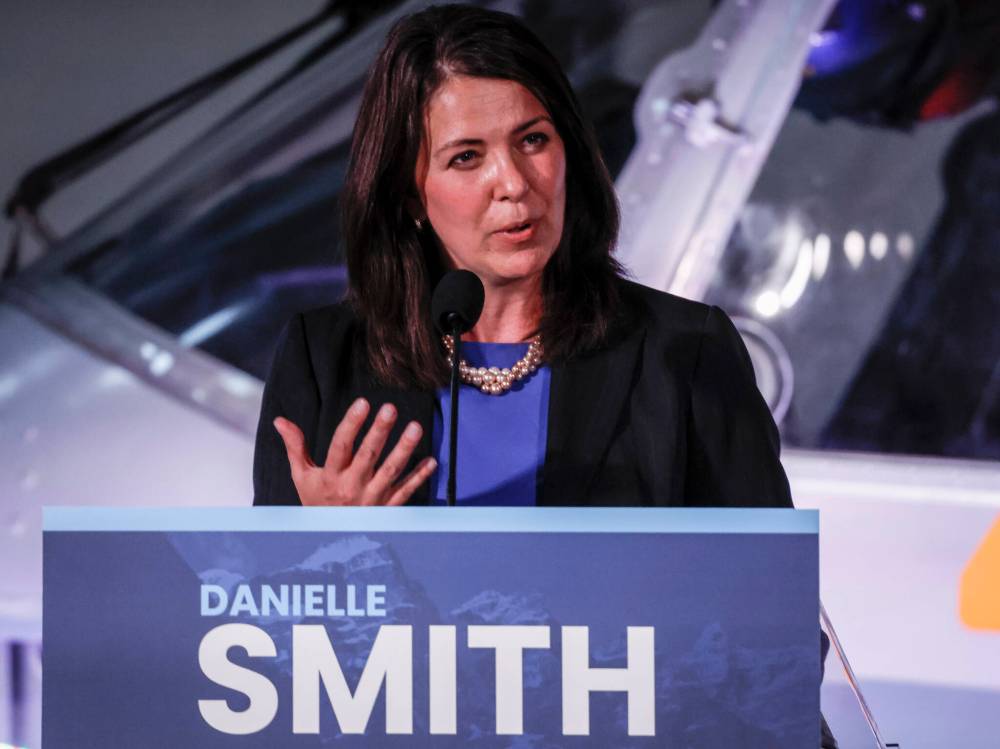Smith must steer UCP toward moderation
Advertisement
Read this article for free:
or
Already have an account? Log in here »
To continue reading, please subscribe:
Monthly Digital Subscription
$0 for the first 4 weeks*
- Enjoy unlimited reading on winnipegfreepress.com
- Read the E-Edition, our digital replica newspaper
- Access News Break, our award-winning app
- Play interactive puzzles
*No charge for 4 weeks then price increases to the regular rate of $19.00 plus GST every four weeks. Offer available to new and qualified returning subscribers only. Cancel any time.
Monthly Digital Subscription
$4.75/week*
- Enjoy unlimited reading on winnipegfreepress.com
- Read the E-Edition, our digital replica newspaper
- Access News Break, our award-winning app
- Play interactive puzzles
*Billed as $19 plus GST every four weeks. Cancel any time.
To continue reading, please subscribe:
Add Free Press access to your Brandon Sun subscription for only an additional
$1 for the first 4 weeks*
*Your next subscription payment will increase by $1.00 and you will be charged $16.99 plus GST for four weeks. After four weeks, your payment will increase to $23.99 plus GST every four weeks.
Read unlimited articles for free today:
or
Already have an account? Log in here »
Hey there, time traveller!
This article was published 17/10/2022 (1149 days ago), so information in it may no longer be current.
The first item on the agenda when a political party chooses a new leader is to bring all those who vied for the top job together and rally toward a common cause.
This show of unity can be a tricky endeavour laden with awkward compromises, whether the party is in opposition or has a firm grip on the levers of government power.
That was likely the initial intention for Danielle Smith, who on Oct. 11 was sworn in as Alberta’s 19th premier. She had won the United Conservative Party (UCP) leadership five days earlier in a members-only vote that required six ballots to determine her narrow victory over Travis Toews, who had been the province’s finance minister.

Jeff McIntosh/THE CANADIAN PRESS
Alberta Premier Danielle Smith
She received 53.77 per cent of the vote in the final tally, which barely surpassed the 51.4 per cent support Jason Kenney, Ms. Smith’s predecessor as UCP leader and Alberta’s premier, received in a May leadership review. That number led to Mr. Kenney’s resignation.
So it is time to build political bridges, and that meant addressing her promised sovereignty act, which threatens to burn bridges between Alberta and the federal government.
During her campaign Ms. Smith said it would allow her province to ignore federal laws and court rulings deemed not in the province’s best interest. The initiative feeds on fears of western alienation, an often-played card in political poker games across the Prairies.
Those who backed Ms. Smith in the leadership vote seemingly didn’t care that the act sits on shaky constitutional ground, but since becoming premier, she has backtracked slightly by saying the planned legislation won’t apply to court rulings.
All this political manoeuvring was forgotten, however, when Ms. Smith ignited a firestorm of a different sort on her first day as premier, when she spoke about the unvaccinated, a faction that heavily supported her leadership bid.
“They’re the most discriminated-against group that I’ve ever witnessed in my lifetime,” Ms. Smith said, somehow neglecting to mention all the wrongs inflicted on other populations based on gender, race or sexual orientation that have occurred since she was born in 1971.
A clarification, but not an apology, followed the next day from her office, addressing the justified outrage her words sparked, saying Ms. Smith is “committed to listening, learning and addressing the issues affecting minority communities.”
The incident showed she has a lot to learn. Campaigning for a party leadership is poles apart from governing, and differs greatly from running to keep her job.
Lost amid the rancour of Ms. Smith’s introductory address is the discussion of how she will lead the UCP into the next provincial election, which is scheduled for May 29, 2023.
Her challenge is similar to one that confronts Manitoba Premier Heather Stefanson and the Progressive Conservative Party.
Ms. Stefanson, like Ms. Smith, earned a narrow victory for her party’s leadership and must go to the polls in 2023.
Both parties’ governments are buttressed by legions of right-wing voters from rural constituencies, many of whom were dead-set against COVID-19 vaccines and defied public-health orders forbidding public gatherings and requiring mask use, which were enacted by the province to prevent the virus’s spread.
Ms. Smith wants more rural representation in her cabinet, but she risks confronting a political arithmetic problem that also stares Ms. Stefanson in the face.
Neither premier can maintain their hold on government solely with rural votes.
That means Ms. Smith and Ms. Stefanson must adjust their policies — and, Ms. Smith might be advised, their rhetoric — to appeal to a more moderate audience or risk losing the powerful positions they fought so hard to secure.




